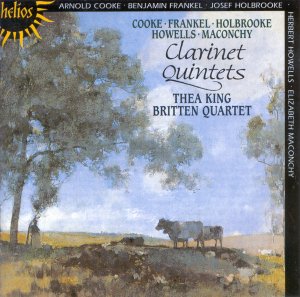The Howells work is pastoral-ecstatic to the
point of voluptuous. The green of fields, the blue of sky - each has
an emotional intensity which defines this particular idle hill of youthful
summer. This is after all the work of a 25 year old and written during
the Great War. It dates from the year after the superb Piano Quartet
and from the same year as the Elegy for viola, string quartet and string
orchestra - the latter written in memory of Francis Purcell Warren killed
in the war. That elegiac vein dominates in the hushed magic of the second
half of this brief work. The Cooke, on the other hand,
might almost be from another universe, separated from the Howells by
two world wars and written in the midst of the massive social revolution
of the 1960s. The year previously, Cooke had completed his ballet Jabez
and the Devil and the second and third symphonies were not far distant.
The Quintet is restrained, lively; terse, alive to the melody inherent
in the instrument but always in tight control. If you find the Howells
too effusive then this work of a Hindemith pupil should suit. Unlike
the single movement Howells it is in three movements. In the vital finale
Thea King ‘paints’ the clarinet’s line in bright lights. The Maconchy
is laid out in four movements but is shorter in total than the Cooke.
Maconchy is no pastoralist but she is more open to emotion than Cooke.
In the timeline her Quintet is flanked by two of her orchestral works:
the 1963 Serenata Concertante for violin and orchestra (recorded
by Lyrita but never made it to CD) and the 1965 Variazioni Concertante
for orchestra. (not recorded but certainly broadcast by the BBC,
notably as conducted by Raymond Leppard). As the late Christopher Palmer
implies in his notes, this piece sounds more mainland Continental than
British - more Bartók than Housman. It is vigorous, bracing,
lightly dissonant but no more than you will already have embraced if
you count the later Bartók string quartets among ‘your’ repertoire.
The Frankel Quintet was written in 1956 for Thea King in memory
of her late husband - Frederick Thurston, doyen of players. Thurston
was in turn a pupil of Charles Draper for whom Stanford wrote his clarinet
concerto. The clarinet was an instrument completely apt to Frankel’s
gift for Bergian lyricism. Once again this is not the lyricism of the
English idyll, real or imagined, but instead of psychology. It is highly
emotional as is much of Frankel’s music (e.g. the Symphonies 4, 7 and
violin concerto) but the language is freely dissonant. This is a lovely
performance accentuated by the Hyperion’s egalitarian balance which
places Thea King in not too eminent a position.
Essentially this is a recital of three British clarinet
quintets of the fifties and sixties when the world had become old. These
are flanked by the Howells work from a young world in process of losing
innocence and Holbrooke’s work of Celtic witchery and nostalgia. Eilean
Shona was the island hideaway of the composer’s patron, Lord Howard
de Walden. Holbrooke holidayed there with him in the teens of the century.
Later he was to give up the island eyrie and move nomad-like between
London, Chirk Castle, Harlech, Africa, America and the Mediterranean.
What of the competition? There have been several recordings
of the Howells (coupled with other Howells chamber pieces) including
on Metier and an old Lyrita LP (c. 1975) and one of Eilean Shona
as part of an all-Holbrooke Dutton Epoch disc. The Frankel has been
recorded as part of a Frankel chamber compilation. Thea King’s playing
has special authority so its claims to your attention are high. Some
of you may prefer a more dominant recording placement for the clarinet.
For me however the balance struck by Hyperion is natural and much closer
to a concert hall sound than many star recordings. The disc is now at
bargain price.
Rob Barnett
